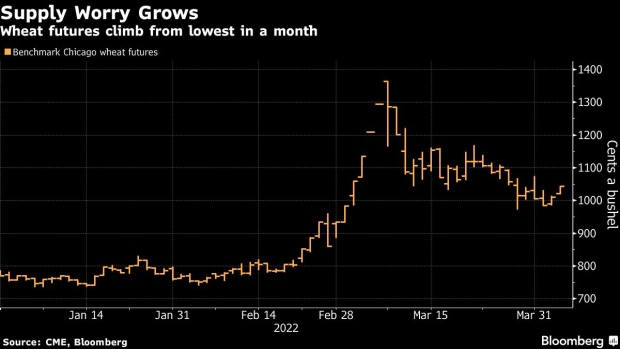Apr 5, 2022
Wheat Extends Surge on Potential for Further Sanctions on Russia
, Bloomberg News

(Bloomberg) -- Wheat futures in Chicago extended their climb from the lowest close in a month on Friday on prospects for more sanctions on Russia in response to allegations of war crimes in Ukraine.
The U.S. said it may impose further penalties this week on Moscow, while the European Union said it will hold Russian authorities responsible for the alleged atrocities. Russia has denied that its forces killed civilians.
More sanctions may impede Russian grain exports, while the war is likely to prevent planting on a large amount of land in the east of Ukraine. Shipments from Ukraine are at a virtual standstill, with its Black Sea ports closed. The war puts at risk over a quarter of the world’s annual wheat and barley exports, about a fifth of its corn cargoes and most of its sunflower oil shipments.
Elsewhere, there is increasing concern over the impact of dry weather on western areas of the U.S. winter wheat crop.
“Forecasters expect no significant precipitation in those dry areas in the next week or so,” said Tobin Gorey, agriculture strategist at Commonwealth Bank of Australia. “Temperatures though are likely to rise from next week, bringing us closer to the time when those crops will actually need moisture. And that will mean a nascent crop problem starts to evolve into an actual crop problem.”
Export Watch
Agricultural products haven’t been directly targeted by sanctions on Russia so far. The country is one of the world’s biggest wheat shippers and has still been exporting at a rapid clip. Problems surrounding payments and a lack of vessels were “mostly” resolved last month, according to consultant SovEcon.
Still, its grain-export union has cited restrictions with logistics, insurance and payment for Russian supply. The sales pace will remain in focus, especially with seaborne trade from Ukraine still halted and as midyear harvests draw nearer, when exports typically accelerate.
Wheat futures in Chicago jumped 3.1% to $10.42 a bushel on Tuesday, bringing the advance over two days to almost 6%. Prices slumped about 11% last week, posting the worst weekly performance since 2011.
In other crops, corn futures increased 0.5% after a 2.1% gain on Monday, buoyed by the U.S. government reporting an export sale to China of more than 1 million tons. Covid lockdowns in China, the largest importer of corn, are disrupting planting at a crucial time in the northeast of the country.
China’s markets were closed for a second day for a holiday on Tuesday. Corn and soybean meal futures have been trading around record highs on the Dalian Commodity Exchange in recent days on tight domestic supplies.
©2022 Bloomberg L.P.






